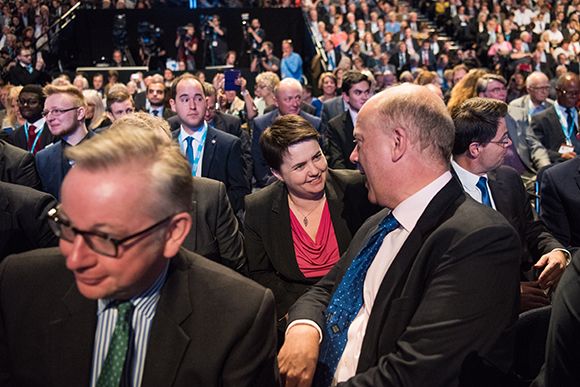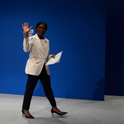Former MP Francis Maude apparently once quipped that the Conservative party has two settings: “complacency and panic.”
Both moods have been on show this year. After obnoxiously striding into an early election in June, the Tories spent their annual conference in Manchester burying themselves in existential angst.
The word most-used to describe the mood of the event was “flat.” The speeches in the conference hall were flat, a lot of the fringe events were flat, and beyond alcohol-induced enthusiasm, even the vibe at the hotel bar was a bit, well, flat.
This was the image the Conservatives projected to the outside world, too: instead of a big reboot, the party followed Labour’s triumphant conference by announcing a few small and forgettable policies. Flat.
Beneath the surface, however, some strong feelings found their way to the gathering. The audiences of Tory members at fringes would often put passionate questions to the panels—a highlight was one audience-member who asked MP Theresa Villiers if the current cabinet was, in fact, “useless, uninspiring and rubbish.” (She responded with admirable diplomacy.)
In others, local government figures would go on passionate rants against CCHQ, the party’s central campaigning body, and receive thunderous applause for doing so.
Even at the evening receptions, safely hidden from most journalists and their own party members, MPs would often look a bit anxious. Some of the younger ones from the 2017 intake looked like they weren’t sure getting elected was the best idea after all, and many backbenchers would vent their frustration at the leadership to anyone willing to listen.
Some parliamentarians did manage to bring a bit of cheer to Manchester. Going from event to event and attending just as many parties were the unlikely trio of Jacob Rees-Mogg, James Cleverly and Ruth Davidson.
The one thing they have in common? They looked happy to be there. Rees-Mogg was delighted by his newfound popularity; Cleverly seems able to feel comfortably at home wherever he goes; and Davidson was still celebrating the solid results her team got north of the border.
The eccentric backbencher, the rising star and the Scottish leader seemed to lift the party’s spirits; they were warmly welcomed wherever they went and appeared on countless selfies with party supporters.
Away from their respective sunny oases, there were few smiles in the house. Had an alien landed at the Midland hotel for the weekend, they could have reasonably concluded that the Conservatives were an opposition party who’d just been wiped out at a recent election, and not a government still polling at around 40 per cent.
It was, in fact, hard to walk around conference for more than a few minutes without wanting to wave a banner saying “cheer up love, it may never happen.”
The snap election might have been a slap in the face for the party, but the panic-induced paralysis that followed felt out of proportions.
Yet if the panic was outsized, it didn’t spur change. Instead of renewal, or a good old fashioned civil war—which some thought might break out in Manchester—the party got itself stuck in a Mexican standoff with the electorate.
In a nutshell: things aren’t great right now, and will probably get worse over time if the party doesn’t do anything, but the real fear is that if the next step the Tories take is the wrong one, they will end up collapsing entirely.
This explains the government’s unwillingness to announce any big, shiny policies, and the different factions’ low-level grumbling on the fringes, as opposed to an attempted coup, or anything more than a token attempt at new ideas.
The over-the-top despair also stems from a sense of indignation about having been wounded by Jeremy Corbyn’s Labour, for which they have little respect.
On Sunday night, a party apparatchik complained that “it wasn’t even someone like Tony Blair.” This was echoed by others throughout the conference: the Tory malaise isn’t just about “how did we come so close to losing?” but “how did we come so close to losing to him?”
Amusingly, they’re not the first group to get through the stages of grief because of the affable left-winger. Once upon a time, centrist Labour MPs and supporters laughed at the idea of Jeremy Corbyn getting anywhere near power. They received a gutpunch when he did, self-immolated in a fit of hysterical panic, then fell into a pit of powerless anguish.
Hearing whispers in Manchester of people desperately wanting Ruth Davidson to come down to Westminster and save them all also felt like an echo of those convinced for a time that if only David Miliband, their prince across the water, could come back for good, he would cast the big bad bearded man into the shadows.
David Miliband never did come back, and Ruth Davidson would be a fool to leave her kingdom to jump into this particular pile of flaming garbage.
No-one is coming to save the Conservatives, and if they don’t decide on a direction of travel soon, they can always look to the Labour centrists to see what awaits them.
The one word used most to describe the mood at Tory party conference? Flat
It was hard to walk around conference for more than a few minutes without wanting to wave a banner saying “cheer up love, it may never happen”
October 05, 2017

Ruth Davidson was one of the few senior Tories whose presence seemed to be welcome. Photo: PA











